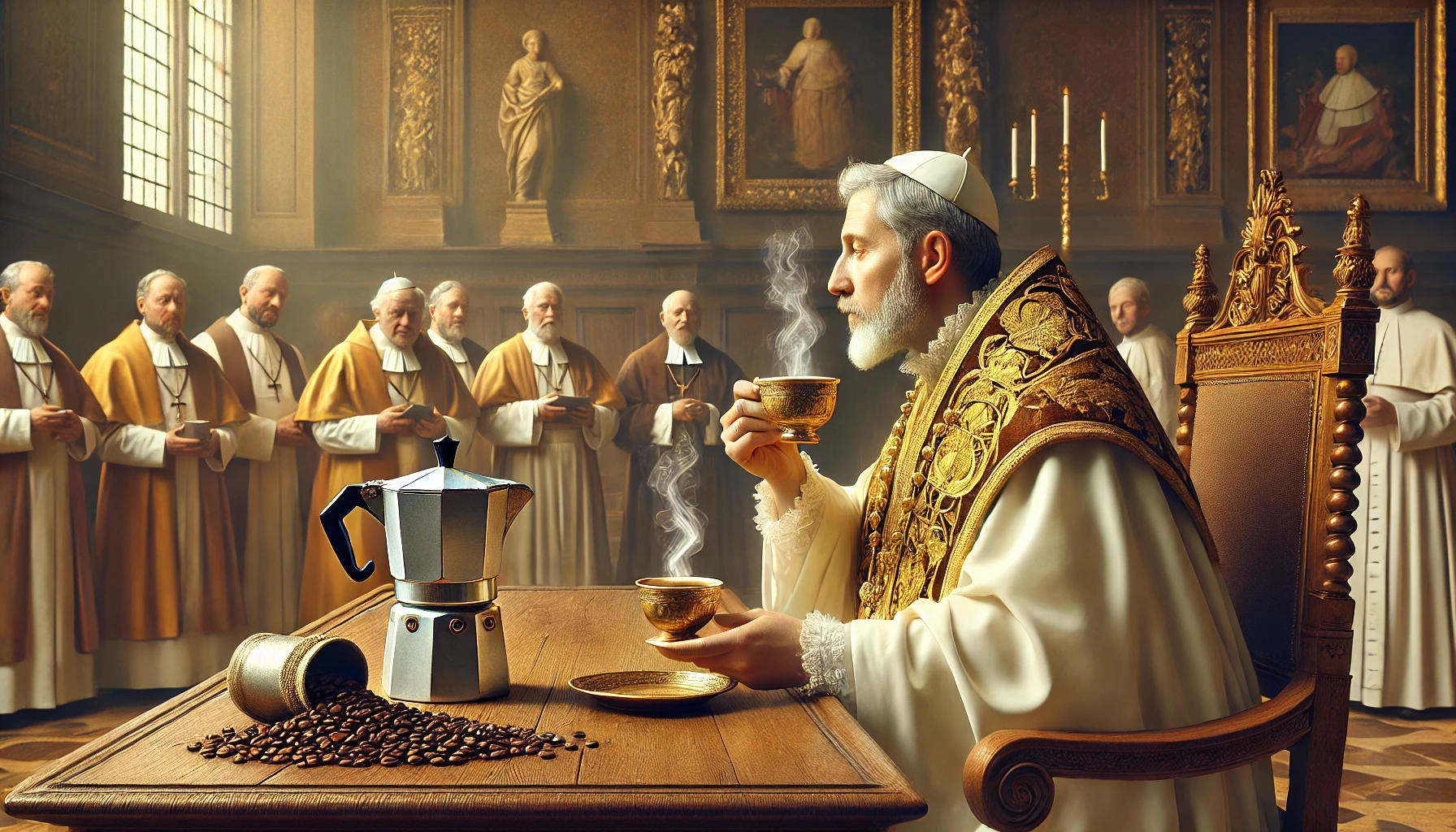Coffee has faced many controversies throughout its rich and complex history. One of the most fascinating—and somewhat legendary—moments occurred in the late 1500s, when coffee, a drink associated with the Islamic world, made its way into Christian Europe. Some religious leaders saw it as suspicious, even heretical. But one man changed everything: Pope Clement VIII.
This article explores the surprising story of how coffee nearly faced religious rejection in Europe—and how a single papal blessing may have helped turn it into a global obsession.
The Context: Coffee’s Arrival in Europe
By the end of the 16th century, coffee had already spread from Ethiopia to the Arabian Peninsula and beyond. It was deeply embedded in Islamic culture, often consumed in bustling coffeehouses from Mecca to Istanbul. These establishments were hubs for music, conversation, and philosophical debate.
When coffee eventually reached European ports like Venice, it arrived not only as a beverage, but also with a cloud of suspicion.
Fear and Religious Suspicion
European Christians were initially skeptical of coffee. Because it was popular in Muslim lands, some Catholic clergy labeled it the “bitter invention of Satan.” There were even calls for the Pope to ban the beverage entirely, fearing it would corrupt Christians or become a gateway to Islamic influence.
For context, Europe at the time was still grappling with religious tensions, crusades, and a deeply conservative view of non-Christian customs.
Enter Pope Clement VIII
Pope Clement VIII, who led the Catholic Church from 1592 to 1605, was eventually asked to weigh in on the controversial drink. To determine whether coffee should be condemned or permitted, he did what any curious leader might do—he tried it himself.
According to legend, after sipping a freshly brewed cup, the Pope was instantly impressed by the flavor. He is said to have declared:
“This devil’s drink is so delicious… we should cheat the devil by baptizing it!”
What Did “Baptizing” Coffee Mean?
Of course, Pope Clement didn’t literally perform a baptism on coffee. The phrase was more symbolic—an act of religious and cultural approval. By “baptizing” coffee, he was essentially welcoming it into the Christian world and removing the stigma attached to its Islamic origins.
This decision opened the doors for coffee to be embraced across Catholic Europe, especially in Italy, where it would go on to become a national treasure.
Impact on Coffee Culture in Europe
After receiving the papal seal of approval, coffee quickly gained popularity. Coffeehouses began to open in major cities across the continent, including:
- Venice, where one of the first European coffeehouses was established
- London, where coffeehouses became known as “penny universities”
- Paris and Vienna, where coffee became part of artistic and intellectual life
The once-feared beverage was now a beloved drink among nobles, clergy, scholars, and everyday citizens alike.
The Legacy of Pope Clement VIII
Pope Clement VIII’s open-mindedness played a significant role in shaping global coffee culture. His decision to accept coffee into European life not only changed the beverage’s reputation, but also paved the way for its commercial and cultural success.
While some parts of the story have likely been romanticized over time, there’s no doubt that the Pope’s influence helped coffee go from a suspicious foreign drink to a European favorite.
Was It Really That Controversial?
Some historians believe the story of the Pope’s baptism of coffee is partly myth, exaggerated over centuries. But what’s clear is that there was genuine concern among some religious leaders, and the Pope’s approval—whether formal or casual—helped turn the tide.
In many ways, the legend reflects a broader truth: that coffee challenged social and religious norms, and yet, it found a place in nearly every culture it touched.
Final Thoughts: How One Cup Changed History
The tale of Pope Clement VIII and his legendary “baptism” of coffee is a reminder of how a single act—whether real or symbolic—can shift cultural perspectives. From being viewed as a dangerous foreign drink to becoming a centerpiece of European society, coffee’s path was far from smooth.
So the next time you enjoy a rich espresso or cappuccino, remember: you might have a curious Pope from the 16th century to thank for it.
